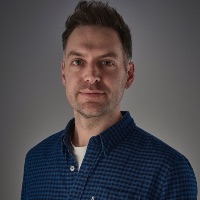Architects' Dan Searle: "Once Tom left us we needed to get back to some kind of normality"
The Brighton metaller on how Architects' magnum opus, Holy Hell, came into being in the wake of unimaginable tragedy
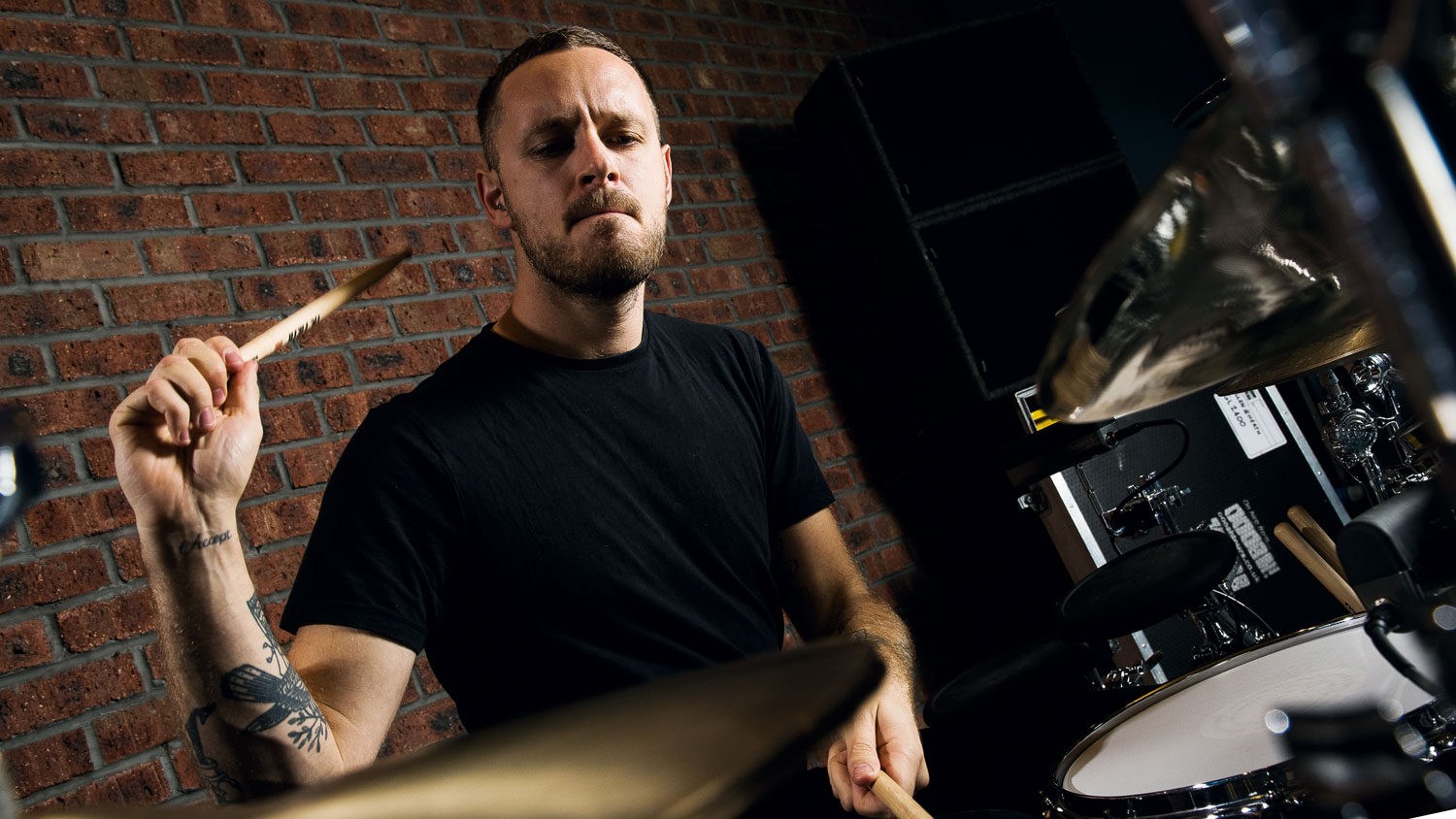
Since we last spoke to Architects drummer Dan Searle in 2014, shortly before the release of the Brighton metaller’s astonishing Lost Forever/Lost Together album, a lot has happened.
Their fanbase grew considerably, connected by a love of their pummelling tech metal sound, remarkable musicianship and intelligent, deeply personal lyrics.
Tragically, as the band he created grew into a phenomenon, Architects guitar mastermind, chief songwriter and Dan’s twin brother Tom battled skin cancer, finally succumbing to the disease on 20 August 2016. Only weeks earlier, Architects released All Our Gods Have Abandoned Us, Tom’s powerful, emotional swansong.
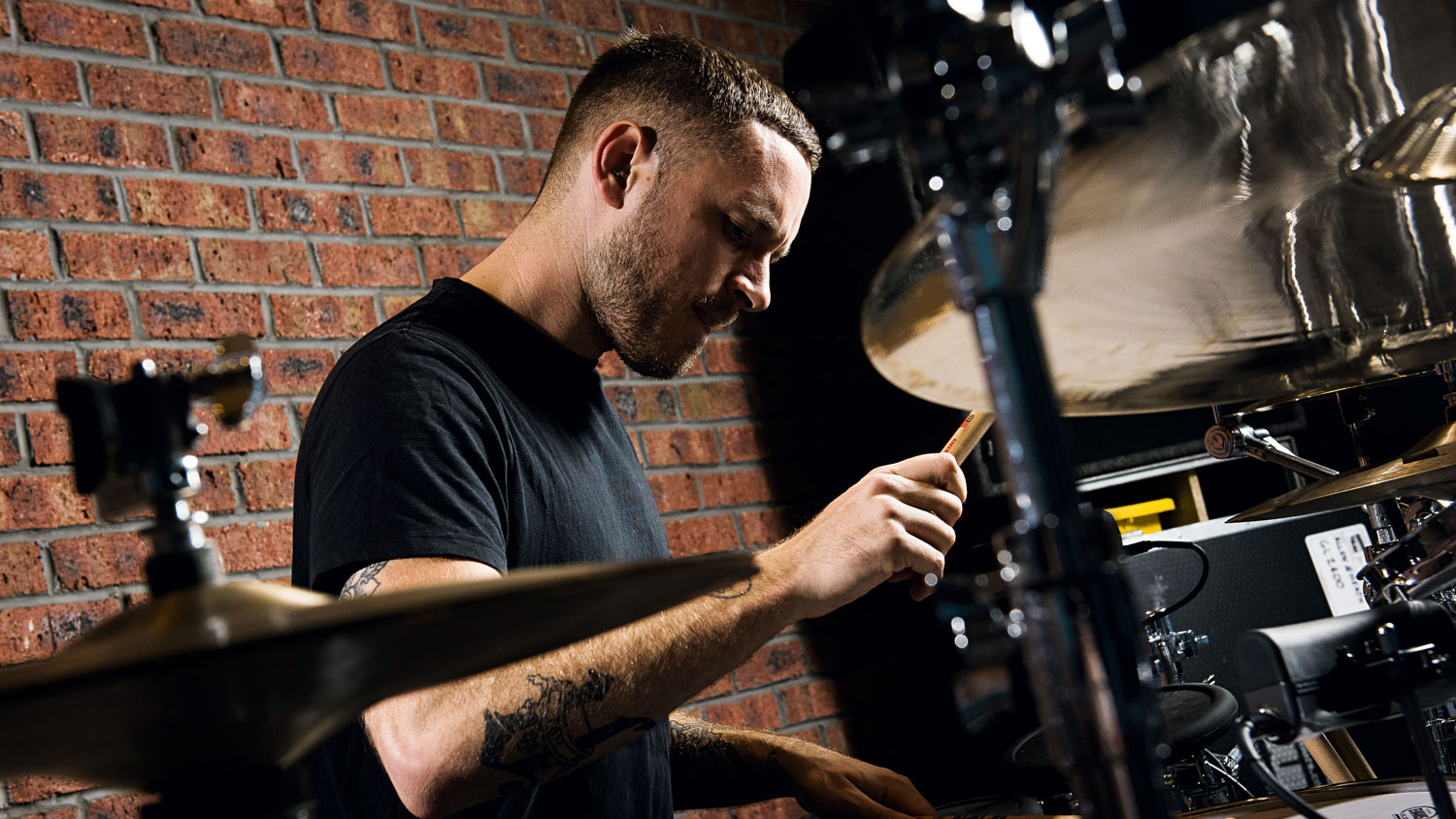
Not only did Dan Searle lose his brother, but the band found themselves without their leader. In the face of unimaginable tragedy, the members of Architects sought solace in the thing they knew best, hitting the road and releasing their emotions onstage. Those gigs culminated in a bittersweet sold-out headline gig at Alexandra Palace.
Stood in Tom Searle’s spot onstage at Ally Pally was Sylosis guitarist Josh Middleton, an old friend of the band who had been invited to fill in. Post-tour, Josh sent a few riff ideas to Dan, which ignited a spark in the drummer.
He gathered what he’d learned from working alongside his brother in the studio all these years, along with the incredibly difficult experiences of the previous year, and set to work on a massively personal new Architects album, Holy Hell.
Dan has always been obsessively meticulous about his recorded beats; the brutal precision and consideration of his parts has always been a highlight of Architects albums. But this time the dynamic changed. Dan’s responsibilities expanded beyond drums to include lyric writing, arranging, producing and more.
It’s always been in my nature to run the show
Whilst drums took a backseat, the approach clearly worked, as the beats on Holy Hell are some of the most organic, song-led drumming Dan has ever tracked, without diminishing any of his signature technicality. His drums sound amazing too, thanks to the brilliant engineering chops of Nolly Getgood, as well as some particularly choice gear.
Since losing Tom, Dan has become a husband and a father, and poured his soul into Architects’ most important album yet. It’s undoubtedly been an intensely challenging, emotional and a healing time and he’s done himself, his family and his brother incredible proud.
You spurred the band into moving forward following your brother’s death. Did you feel the pressure to decide the future of the band?
“I think, given that Tom was my brother, everyone was waiting to see how I felt. But I’ve always been that person that has organised everything for the band. All the stuff that isn’t playing drums and writing songs, I’ve dealt with everything else I suppose.
“It’s always been in my nature to run the show. I just felt straight away that I’ve got to make this happen, to move things forward. I knew it was going to take a long time and there was going to be a lot of hurdles to get to where we needed to be, but straight away I felt like, ‘Right, let’s get on with it.’
“The first couple of months after someone close to you dies, it’s such a blur anyway. It made sense for us to just go and get on with things in that period.
“It was actually when we got home from that bit of touring right after Tom died that it really hit me. That was roughly when we began writing for the record and trying to take those first steps of moving forward into the future.”
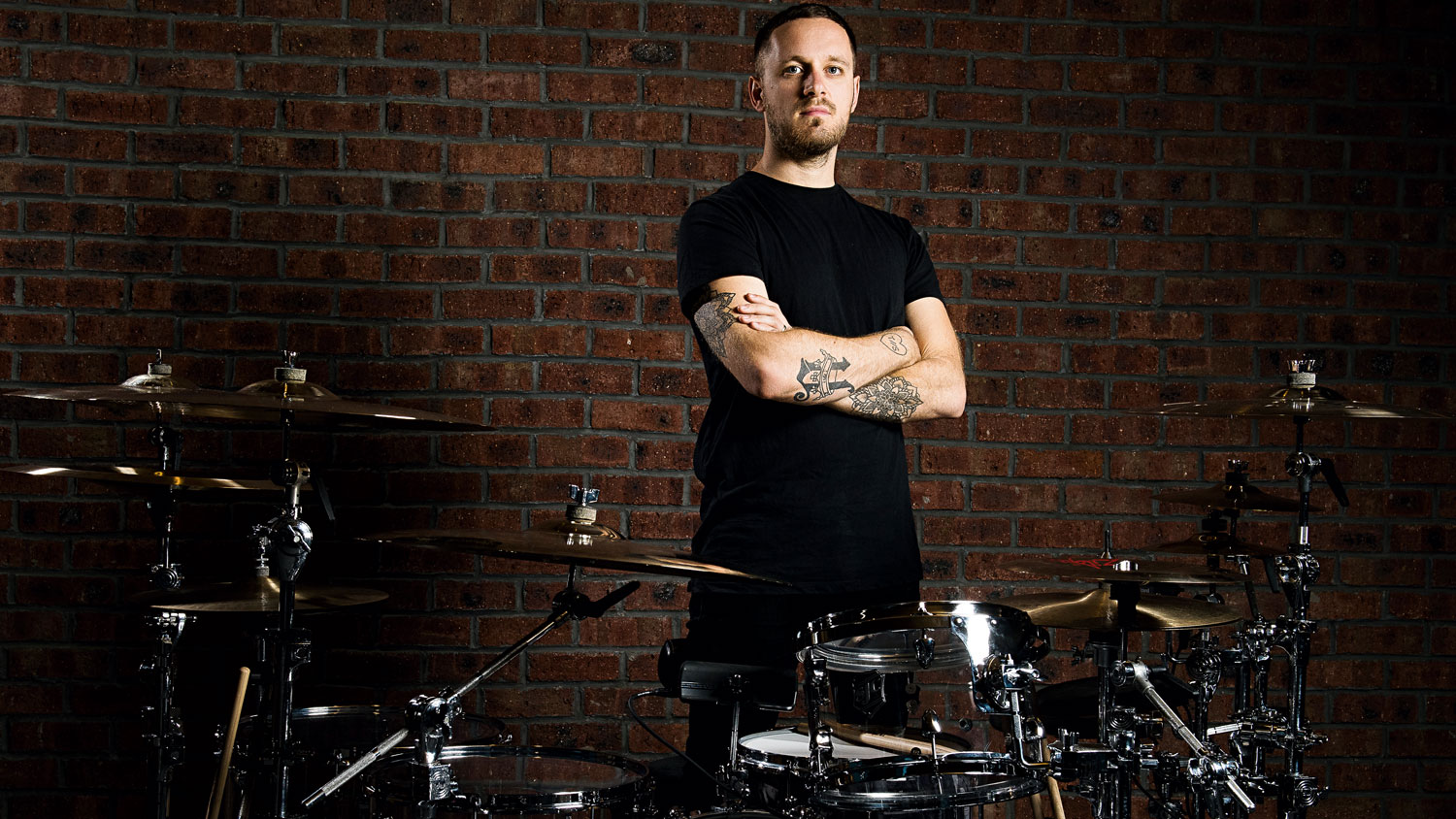
As you said, after Tom died the band hit the road almost straightaway. Was that a therapeutic time for you?
“Tom’s wasn’t a sudden death. It was drawn out. It had been coming for a while, although I hadn’t admitted to myself that it was. The reality was that it had been a long road.
“Once he left us it felt like we needed to get back to some kind of normality. It felt a bit crazy to do that, but for us there was a longing to feel some semblance of normality or familiarity. For us the best way to get that was by touring and doing what we’d always done.”
Many players use the drum kit as much as an emotional outlet as they do a creative one. Have you been able to channel your emotions through your drum kit?
“It depends on the song we’re playing. If it’s immediately after Sam’s spoken about Tom or it’s a song about Tom and what he went through then, yeah, that will be coursing through me as I’m playing the song.
“I probably hit the drums and cymbals a little bit harder, which Zildjian won’t thank me for! But, yeah, it has helped. I think it’s important when you go through anything like that that you let those feelings out.”
You were the driving force behind the new album, which still very much sounds like an Architects album, even without Tom’s direct input. Did you feel confident going in that you could make an Architects album?
“I believed we could do it, but there were many times when I felt unsure. Sometimes with songwriting, some people will get what they want on the first attempt and some people will get it on the 1,000th attempt.
“I’m not going to say it took us 1,000 attempts, but it’s sometimes a matter of how much you’re willing to fail and start again, to have the courage to admit you’ve spent two weeks on something and it’s wrong, and go again.
I was obsessed with the drums when it came to recording before. Now the obsessions were being directed elsewhere
“That was a big thing for me. There were so many learning curves in the process for me.
“I had a strong sense of what I wanted the album to be. I had a strong idea of the different elements that it would have, the dynamics it would have and the diversity of styles it would have, but I didn’t actually know what it would sound like.
“It was more like an intention that I had for the record. It was just a matter of grinding it out and sculpting it as it went. With songwriting there’s only so much you can steer the ship. It sort of comes to life on its own.
“Such is the nature of creativity. Of course, you’re collaborating with other musicians as well, specifically Josh. A lot of [the process] was building a creative relationship with him.
“He was amazing, such a blessing for us. It really can’t be overstated. He’s played such a key role. I think his contribution will be overlooked because his role is not the juicy story in this, but without him it would be very different.”
In the recent Holy Ghost documentary the guys in the band talk about how your approach in the studio was very similar to your brother’s. Do you think after all these years working alongside him you’ve morphed into that role?
“We were always very similar in that respect. That was his position in the band. I totally trusted him so I let him get on with it and it wasn’t necessary for me to play that role. In his absence I found myself behaving in very similar ways. And not always good.
“I didn’t approve of Tom’s obsessive nature when it came to writing music and especially recording music. Then, of course, I was very similar when it came to doing the same role. Often I had to rein myself in or my wife would have to have a word!
“I got obsessed with this. I was obsessed with the drums when it came to recording before. Now the obsessions were being directed elsewhere. It was quite nice because drums were much more relaxed.”
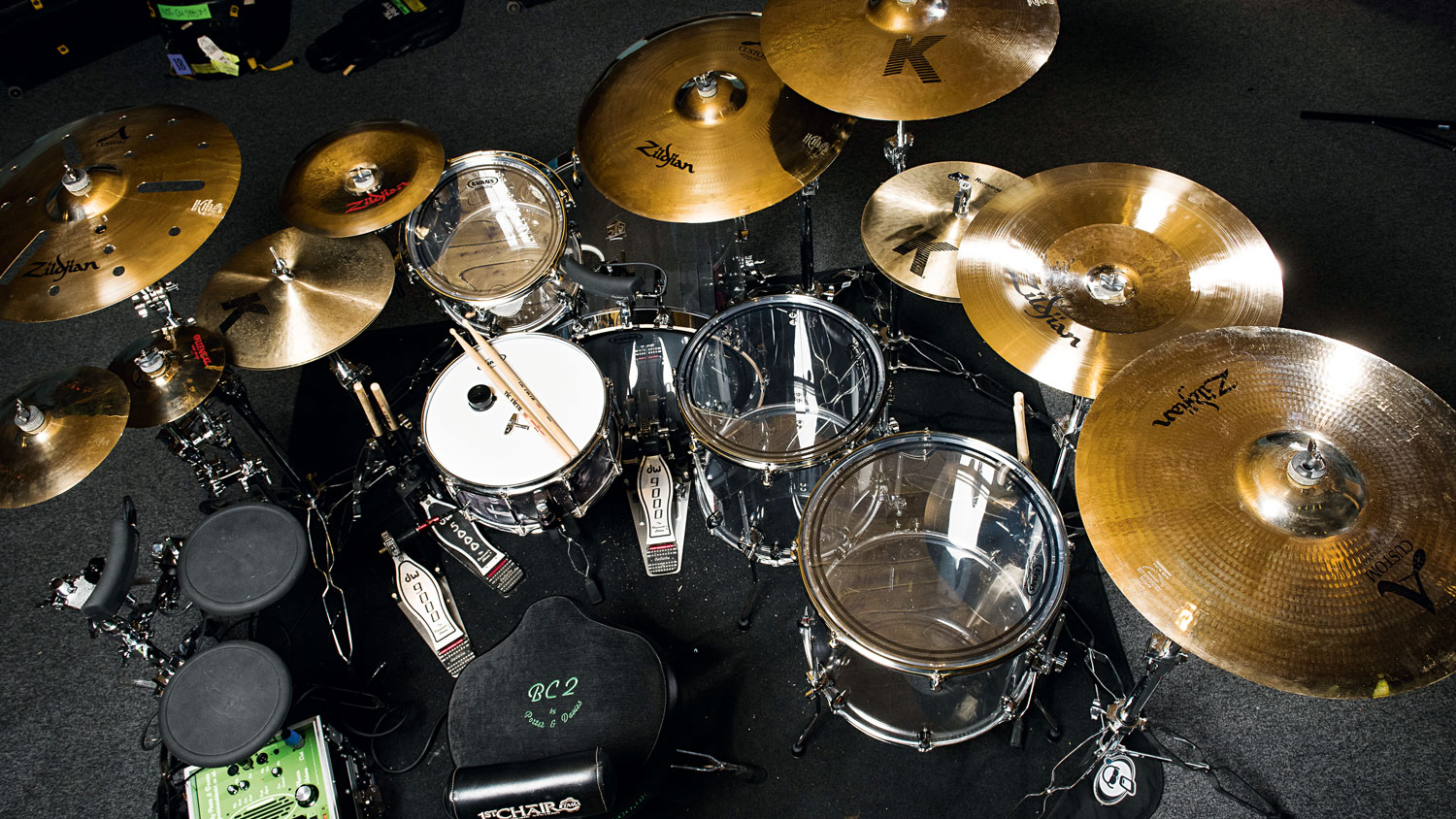
Focussing on the album as a whole must have been a distraction from the drums?
“It distracted me enormously. I just didn’t have the time. I finished writing 14 or 15 songs with Josh, then it looked like we should go and book studio time. That meant we needed to start working on vocals because they can radically change the songs and make you reconsider the structure.
“Then I got into working on the vocals with Sam, which was basically every day for a long period of time. I wrote all the lyrics as well, which was the first time I’ve ever done that. That took a lot of my time and thoughts as well.
“ It was coming up to the time to go into the studio and I hadn’t played any of the drum parts and I had two days in the end to learn the songs at the kit.”
Were the drum parts programmed at this stage?
“Yeah, that’s how we’ve done it for a long time. It’s nice because you get a good sense of how the parts are going to sound, but when you then don’t have the time to learn the complicated parts that you’ve mapped out it becomes a new challenge.
“There were times in the studio where I would be learning the song the night before I tracked it, or even the hour before. Usually, I know every single detail of what the drums are going to do; every hit on every drum and every cymbal, I’d know exactly what I’m going to play.
“This time it was much more freeform. Specifically, fills were the parts where I didn’t come with many specific ideas that were set in stone. It was an opportunity to try stuff out in the studio, which I’ve never done before.
“Interestingly, I came out of the sessions much happier with the drums that I usually am, because I wasn’t so attached to what they had to be.
“Those obsessions became about other stuff like the vocals. I was still obsessing and driving myself totally crazy, but about various different aspects.”
Do you feel like your drumming progressed on this album?
“I don’t think I took great strides drumming-wise on this album if I’m absolutely honest. It was more about making sure that the songs were moving the band forward and we were stretching the limits of what we could do in a song and trying to break new ground.
“That’s really important, especially in this context, trying to find a balance of how far we can take things, with everyone understanding that this is an album without Tom. Drumming-wise, it wasn’t an album where I was all that focused on trying to improve myself.
I always try and serve the song, but if it’s your sole focus you’re always going to try and tow the line a little bit
“It definitely made me see drums in a different way though. I always try and serve the song, but if it’s your sole focus you’re always going to try and tow the line a little bit, whereas with this album I was looking at the whole thing, much more holistically I suppose.
“I don’t think the drumming has got any less intricate or complicated. This is our eighth album and I have a lot of experience making records and tracking drums. When I’m writing, a lot of that comes to me like it always has done.
“It was just harder for me to pull it off because I had so much less time to find the muscle memory that I needed when I came to the studio. But that was just an extra challenge, you know?”
In the documentary there’s a shot of you playing guitar. How hands-on did you get with that?
“I certainly didn’t write any of the riffs or track any guitar. But I wrote some simple parts, whether it was a chord progression for a chorus or a couple of bits of ambient guitar sat in the background.
“After Tom died I immediately started playing guitar thinking, ‘Right, this is my insurance policy. If we can’t find anyone I’ve got to learn guitar and make sure I can write an Architects album.’ I was playing three or four hours a day.
“As soon as Josh came along and showed what he could do, that went down to more like 20 minutes a day because I realised it wasn’t so necessary and I could focus my energy elsewhere. It also made me realise how difficult the guitar was!
“I did a lot of my work on a computer. That’s why there’s a lot more electronic elements and synths and stuff compared with our older stuff. That was my vehicle to be able to contribute a lot of musical stuff outside of the riffs.
“Riffs are way beyond my ability. Thankfully, I have Josh who is very, very accomplished.”

That must have helped you come to this album with a greater understanding of the role of the guitar?
“Absolutely. That was so important for me to make this album happen. My musical knowledge extended to a music GCSE. I knew how to piece a song together, but to try and decipher the bricks and mortar of a song was way beyond me.
“That was a massive learning curve for me to understand what the guitars are really doing and to understand music outside of kick, snare and hats. It’s a different world, a different discipline.
“It was a massive amount of learning for me, but I was really driven and focused to make it happen. Fortunately, I had the time outside of touring to be able to obsess over it.”
Where was the album recorded and who with?
“We recorded at Middle Farm in Newton Abbot, Devon. It’s a lovely rural studio, and the drum room is in a converted barn. It’s an amazing sounding room. This is my favourite drum sound we’ve had on any of our records.
I see people looking down their noses at professional footballers at the highest level. Most people will never comprehend or understand the amount of time, effort and sacrifice those individuals have put in to get to that level
“It was engineered and mixed by a fella called Nolly Getgood. He did an unbelievable job. He did ‘Doomsday’ with us. We treated that as a trial run to see how it worked recording with him. He did a great job and it was an easy pick.”
What drum gear did you use to record?
“To be honest, Nolly knows drums way better than I do. That’s partly why we went to him. He’s a drum nerd!
“We used a Pearl Reference brass snare and I used all the same Zildjians that I normally use, but we changed my ride. I used SJC toms and a different kick drum, but I can’t remember what that was.
“Nolly would do a better job than I ever could in terms of picking out sounds, so I left it to him. He would ask my opinion, and I would say, ‘If you think it’s going to sound good, then I’ll use it.’”
Architects and Bring Me The Horizon are leading the way in British metal. Why do you think the British metal scene is so healthy right now?
“I think both us and Bring Me The Horizon are just stories of absolute persistence. Architects have sat at a lower rung on the ladder for a long, long time. We’re late developers in a sense, especially in terms of the success of the band. England has a strong tradition.
“You look at some of the most innovative bands that have ever existed – you’re talking about the Stones, The Beatles, Led Zeppelin, Black Sabbath, of course. These bands bashed down the doors and made so much of this possible for us today.
“Perhaps in a small way, us and Bring Me The Horizon are a part of that in 2018, carrying on a tradition of writing good music.
“Actually, I think that’s a really important point, I think both of us want to write good songs, first and foremost. That sounds pretentious, but that really is the truth, it’s all about the songs.
“If the songs are great then people will listen to them. It’s easy to forget that when you start a band or you’re in the centre of it. That’s something that I had to learn.
“I think with any band, at least someone in the band needs to be obsessed with it. Without obsession you’ll just fall behind the other bands, because the other bands will have people that are obsessed. It’s like this with any pursuit. It’s easy to take other people’s success for granted.
“I see people looking down their noses at professional footballers at the highest level. Most people will never comprehend or understand the amount of time, effort and sacrifice those individuals have put in to get to that level.
“Speaking from my own experience, with this record I really gave everything – all my time and energy – and I was obsessed with it for a long time. That’s just what it takes.”
I'm MusicRadar's eCommerce Editor. In addition to testing the latest music gear, with a particular focus on electronic drums, it's my job to manage the 300+ buyer's guides on MusicRadar and help musicians find the right gear for them at the best prices. I dabble with guitar, but my main instrument is the drums, which I have been playing for 24 years. I've been a part of the music gear industry for 20 years, including 7 years as Editor of the UK's best-selling drum magazine Rhythm, and 5 years as a freelance music writer, during which time I worked with the world's biggest instrument brands including Roland, Boss, Laney and Natal.
